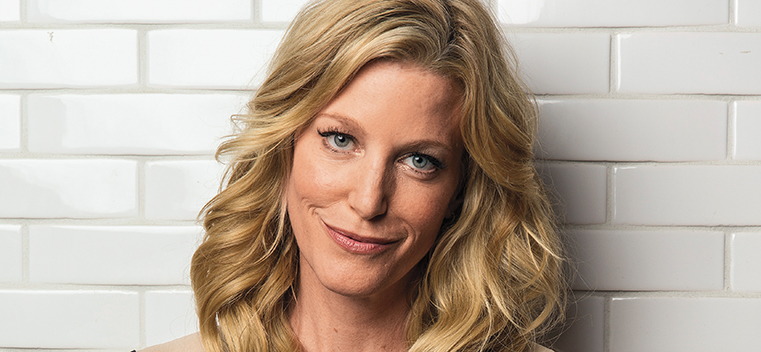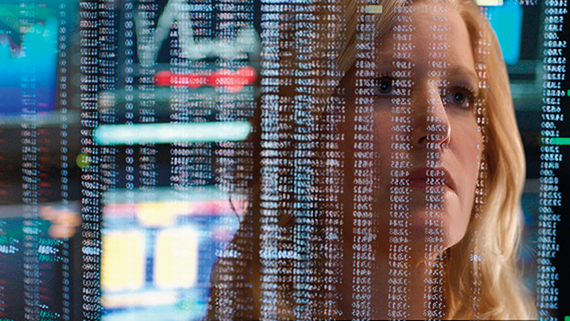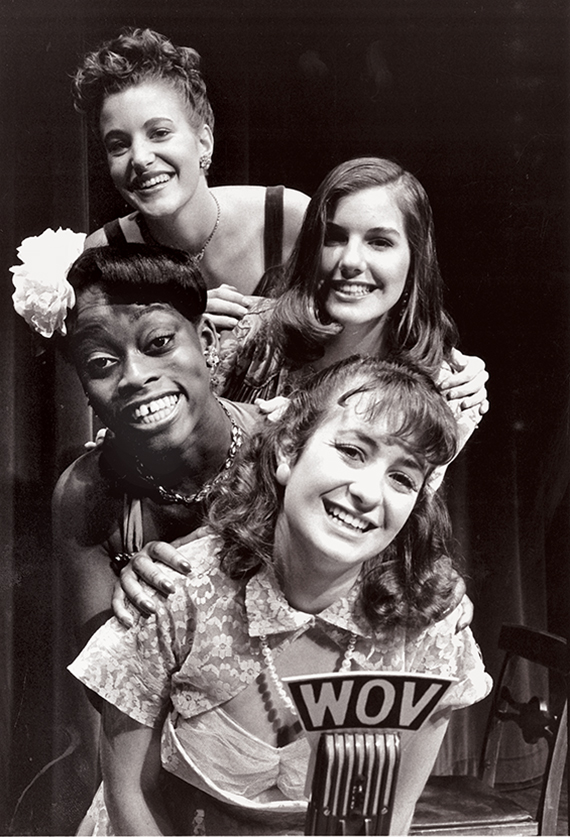
Breaking New Ground
Jenny Hontz ’93 is a freelance writer and journalism instructor in Los Angeles.
Home page photo of Anna Gunn by Andrew MacPhearson.
Tell us what you think. E-mail comments or questions to the editors at letters@northwestern.edu.
Find Us on Social Media
Anna Gunn has gone from her two-time Emmy-winning role as Skyler White in Breaking Bad to the lead role in the Wall Street film Equity.
The night before actress Anna Gunn was set to make her debut as Ginger in The 1940’s Radio Hour musical at the Josephine Louis Theater, she and her friend Dan Jackson were goofing off, pretending to fight on the second floor of their freshman dorm, Jones Fine and Performing Arts Residential College.
“We were practicing some stage fighting we’d just learned in class,” Jackson ’90 recalls. “Everybody was laughing and having a good time.”
The fun suddenly ended when “I accidentally smacked her right in the middle of her nose,” Jackson says. “I broke her nose. Everybody heard the crack. She just looked at me, and I looked at her and said, ‘Oh my God, what have I done?’ I spent that night standing over her bed with an ice bag on her nose as she slept. And she had to go on and sing with a broken nose.”
And go on Gunn ’90 did. “She sang this song in the middle of the show called ‘Blues in the Night,’ which is a fantastic song,” Jackson says. “And Anna just nailed it — brought the house down.”
With that type of gut-it-out toughness, it’s hardly surprising that Gunn has managed to build a career in theater, film and television since she left Northwestern — starring in two critically acclaimed TV series, Breaking Bad and Deadwood — as well as playing the lead character, Naomi Bishop, in the summer release Equity, which has been billed as the first all-female Wall Street film.
Gunn, sipping an iced coffee in jeans and a leather jacket at GC Marketplace in Los Angeles last May, describes herself as “strong-willed — strong on the outside, tender on the inside,” which is also a perfect description of her Equity character, an investment banker who is struggling to overcome her first failure on Wall Street and the perception that she’s not “likable” enough to land a big promotion at her firm.

Anna Gunn plays investment banker Naomi Bishop in the film Equity. Photo courtesy of Sony Pictures Classics.
The issues explored in the film are especially timely, Gunn says, in the midst of a presidential election in which Hillary Clinton faces similar questions about “likability” in her bid to become the nation’s first female president.
“Women have to deal so much more with the likability factor, and that goes for Wall Street, politics, acting, journalism — pretty much anything,” Gunn says. “It’s a disturbing thing, that whole idea of, is she likeable enough? When I was researching the role for Equity, a lot of these banking women said you almost have to walk a tightrope between being tough — but not too tough, so that you’re not perceived as abrasive or difficult — and also not being perceived as too soft or a pushover, constantly trying to find that middle ground because that world is such a male world.”
Equity was written, directed and produced by women at a time when the lack of opportunity for female talent in Hollywood has been a trending topic. Coincidentally the film wound up being a bit of a purple production. The film was co-produced by Linda Zwack Munger ’78, while actor Craig Bierko ’86 also had a pivotal role.
Munger, who worked on Wall Street herself, like many of the female investors in the film, describes Gunn’s character as “tough — as she has to be. Nobody makes it to her level on Wall Street without that. But there’s vulnerability there as well. I love that combo. Anna’s facial expressions tell it all. She has a wonderful nuance about her.”
Throughout the film, Gunn remains tightly coiled, seething under a stoic exterior, but ready to explode. “There’s so much going on under the surface,” says Equity director Meera Menon. “So you need an actor like Anna, who has a novel’s worth of depth in the silences that she communicates. There’s so much going on there that piques your interest as a viewer.”
Gunn immediately related to the character, having gone through her own gendered “likeability” challenges when she played Skyler White in AMC’s Breaking Bad. She wrote about those experiences in a 2013 op-ed piece in the New York Times titled “I Have a Character Issue,” which explored the hate-filled reactions to her character on the internet — reactions that eventually turned to violent threats against Gunn herself.
“As an actress I realize that viewers are entitled to have whatever feelings they want about the characters they watch,” she wrote. “But as a human being, I’m concerned that so many people react to Skyler with such venom. Could it be that they can’t stand a woman who won’t suffer silently or ‘stand by her man’? That they despise her because she won’t back down or give up? Or because she is, in fact, Walter’s equal? It’s notable that viewers have expressed similar feelings about other complex TV wives — Carmela Soprano of The Sopranos, Betty Draper of Mad Men. Male characters don’t seem to inspire this kind of public venting and vitriol.”
Gunn says the attacks “felt personal to me,” but she and the writers of Breaking Bad tried hard to understand what was going on. “They never intended for her to be some sort of shrewish harpy. She was just a real woman with real problems, dealing with it in a real way,” she says. “She does wear the pants a bit more in the beginning because he’s a guy that’s lost his way and is kind of just plodding through life. She’s the one who’s got to say, ‘Well we can’t put this amount on this credit card,’ and ‘We gotta paint the baby’s room because the baby’s coming.’ And she’s that person who, in order to keep herself together, tries to control her external environment.”
When her husband on the show, a science teacher played by Bryan Cranston, started cooking meth to fund his cancer treatments and evolved into a drug kingpin, his character was able to rise above the disempowerment that Gunn believes many men were feeling during the Great Recession. “It was a time when people were losing their jobs, losing their houses, not having health insurance, not being able to provide for their family,” Gunn says.
What many viewers failed to understand was that Skyler was, in essence, set up as the show’s antagonist. Creator Vince Gilligan refused to allow the audience to see Skyler alone in her private moments, which might have made the audience identify with her instead of Walter, the show’s antihero.
“Vince was very smart because, had he done that [allowed viewers into her private moments], the audience, quite possibly, could’ve gone over toward her camp. And if you start hating the antihero, who’s at the center of the story? Then where do we go?” she asks. Nevertheless, “it was shocking to us all” that the audience continued to root for Walt even as he devolved into a killer. “Vince thought, ‘Whoa, what’s going on here? It’s like the id gone wild.’ ”

Skyler White, played by Gunn, and her drug kingpin husband, Walter (Bryan Cranston), stare at a large pile of cash stashed in a storage locker during season five of the AMC series Breaking Bad. Photo by Lewis Jacobs/AMC.
Gunn won two consecutive Emmys as Outstanding Supporting Actress in a Drama Series in 2013 and 2014 for her role in Breaking Bad, which Gunn credits, in part, to the material.
“The quality of the writing [on Breaking Bad] was so high, and so far beyond almost anything else,” says Gunn. “I mean, I was lucky to come from Deadwood, where obviously the writing was incredible as well. So, I felt like, how is this possible that I can be a part of a second show like this?”
Those who remember Gunn from Northwestern say luck has little to do with her attracting such high-quality work. “Anna was definitely the Meryl Streep of Northwestern,” says Jill Cargerman ’90, her freshman-year roommate, of Gunn’s versatile acting skills. “She was Meryl Streep with shoulder pads and a perm — it was the late ’80s, after all.”
Gunn first caught the theater bug in high school at Santa Fe Prep in New Mexico and arrived at Northwestern’s theater program in the School of Communication already focused and serious about her work. She was one of just two freshmen cast in the fall 1986 musical, The 1940’s Radio Hour. “She seemed to have come to school with a sense of her own creative artistic process pretty clear in her mind, in her being,” says associate professor emeritus in service David Downs, her theater teacher for three years. “She certainly made an impression on people.”
Gunn auditioned her freshman year for Harold Pinter’s The Homecoming, and while Downs was impressed by her audition, he cast a senior for the one female role. “The very next day, after the cast list came out, she came to my office and wanted to discuss [it],” Downs recalls. “As a freshman she wanted to talk about her audition, what it was that I saw, what she could do to improve. And I remember thinking, lots of times people come into my office [upset and crying], ‘Can I talk to you? What happened?’ ”
Gunn, however, remained perfectly composed. “She was always a mature, self-contained person, even as a freshman,” Downs adds. “She had a kind of interiority. You knew there was lots going on, but she did not allow herself to become discombobulated by the world or taken by surprise or knocked off balance.”

Members of the cast of The 1940’s Radio Hour, from top to bottom, Anna Gunn, Jennifer Marshall ’89, Dorcas Johnson ’87 and Susan Bachman Rovner ’88. Courtesy of University Archives.
Her memory of her state of mind at the time is a bit different. “Freshman year, the first winter, I remember feeling overwhelmed by the amount of work — I think I was probably doing a play at the time, as well — and by wanting to do everything perfectly,” Gunn says. “I just remember so distinctly that the feeling of, my mom and dad worked so hard to get me to Northwestern, and I wanted to do this seemingly impossible thing, this career that everybody sort of goes, ‘Oh boy, good luck with that.’ ”
What turned her attitude around was a walk by the lake in the bitter cold. “I put on my biggest coat and I walked out, right on the lakefront, and it was so windy that it was like that kind of thing where you’re trying to take those steps forward, and it’s almost pushing you back,” she recalls. “But there was something that was so — it’s a weird word to use —cleansing about it, really. I needed that. I needed that wind to blow on my face and remind me that not everything has to be so heavy and important.”
That wind cure seemed to work. Gunn was cast in the Waa-Mu Show that spring and mounted several independent campus productions with her friends over the next few years, one of the most memorable being Fefu and Her Friends, which they staged in a conference room in the Norris University Center.
“It’s a very dense, very unusual, heady, feminist play about eight women in the mid–1930s,” Gunn says. “I was in a wheelchair. I had to have a blood squib in my hand in the final scene of the play, squeeze it against my forehead and then fall back dead. It was all very dramatic.”
“She is nothing like the characters she’s portrayed on camera. She’s very warm and loving and kind and effusive. ... She’s giving, to a fault, very easily free with her emotions and love.” — Dan Jackson
Gunn graduated two quarters early, and within a few years of that first unsuccessful freshman audition, Gunn and Downs — student and teacher — were working together professionally as actors in the play Uncommon Ground at the Northlight Theatre, then in Evanston. She also appeared in The Beggar’s Opera at the Court Theatre in Chicago in 1990, as well as in Peacekeeper opposite Jeremy Piven at the American Blues Theatre later that year.
“I was able to afford an apartment and eat some ramen and pay for heat and keep it going while I was doing those plays,” Gunn says.
There were months of struggle, however, when those acting gigs ended, and Gunn had to take a job cleaning out condos for Merry Maids during one of the city’s oppressive heat waves. “It was insanely hot,” she recalls. “I remember being hotter than I’ve probably ever been in my life.”
Gunn was at a crossroads. She had been terrible at temp work and even worse as a waitress. “I remember scrubbing a toilet or scrubbing a floor and saying to myself, ‘You know, mom and dad aren’t gonna bail you out.’ My parents made it clear that they were going to send me to school, but then after that, it really was like, ‘You’re choosing a tough career, so you gotta make it work.’
“I’m so glad they did that. I knew they meant it, and I knew that there was no fallback. I just remember thinking, ‘You gotta just keep going. This is what you wanted to do.’ ”
Shortly thereafter, she landed the Fox sitcom Down the Shore and never took another side job again. Whether it was guest stints on The Practice, NYPD Blue and Seinfeld or a part opposite Jon Voight in the film Enemy of the State, Gunn managed to work steadily and, at the same time, flex her artistic muscle at the Matrix Theatre Company in Los Angeles in the evenings.
Gunn got her big break in 2004 when David Milch wrote a part for her in the period drama Deadwood. Then, months after the birth of her second daughter, she almost passed up the role of a lifetime because she was too sick and exhausted caring for her newborn to audition for Breaking Bad.
The casting director, however, was persistent. “She called me and said, ‘Get your keister in here.’ ” Once Gunn read the script, she knew the show was something special. “It truly was one of the most extraordinary scripts I’d ever read — unlike anything else.”
Then when series creator Vince Gilligan described her character as “Carmela Soprano, but she’ll be in on the crime,” Gunn “just went, ‘Sold.’ That’s it.”
While Gunn typically plays characters that are stony and serious, friends and colleagues say the actress herself is nothing of the sort.
“She’s a total goofball,” says Deborah Sullivan ’90, who lived in Jones with Gunn and has stayed friends with her ever since. Cargerman agrees that Gunn is “much more outlandish than people might expect,” and she describes their time in the dorm as “somewhere between a 24-hour therapy session and Burning Man, having this crew we rolled with, staying up all night. Anna has this great voice, and we would basically entertain the troops all night.”
“It was a little like the movie Fame 24/7,” says Jackson, who thinks Gunn gets typecast in cold, stoic roles because she is tall, glamorous and Nordic looking. “She is nothing like the characters she’s portrayed on camera. She’s very warm and loving and kind and effusive. She gets cast in roles that are hard-edged. In real life, she’s radically different from that. She’s nothing like Skyler White. She’s giving, to a fault, very easily free with her emotions and love.”
When Gunn was starring off-Broadway in Sex with Strangers in 2014 (a performance that earned her a Lucille Lortel Awards nomination for best actress, in a play written by Laura Eason ’89 and directed by David Schwimmer ’88), Jackson went to New York for the Fourth of July and spent the day watching Gunn’s two daughters, now 9 and 15, while she was “working her butt off,” he says.
“We came back to the apartment rented for them to watch fireworks in Battery Park. We walked in the door to find that Anna had returned from rehearsal and decorated the entire living room with red, white and blue banners and streamers that said ‘Happy Fourth of July.’ Who does that? That was pretty special. She is a great mom and goes out of her way every day to make her daughters happy.”
Gunn recently joined Jennifer Lopez’s TV series Shades of Blue in a recurring role as a city councilwoman on the rise. Her character, a former police officer who launched a political career, reportedly reveals a darker and Machiavellian side as the season progresses.
Gunn’s friends and family hope to see Gunn’s funny side get more airplay, and Gunn has, in fact, been pursuing more comedy roles, including guest roles on Portlandia and The Mindy Project.
“People who meet me, who have only seen me in Breaking Bad or Deadwood, are always surprised that I like to laugh,” Gunn says. “I love to laugh, and I love to have a good time.”
Nevertheless, “I’m an intense person for sure,” she admits. “The people who know me encourage me to do more laughing and less worrying sometimes.”
That worried freshman with the weight of the world on her shoulders has never fully disappeared.
“I wrote a commencement speech for my high school about being passionate and caring about the thing you do. However, on the other side of that can be fear and worry and anxiety, because if you care about it that much, you’re going to want to do your best at it,” she says.
But the lessons learned walking through the wind on the lakefront have stayed with Gunn ever since. “I think I just started realizing — yeah, work hard and do your best at everything, but also you’ve got these great friends, you’ve got this one time to have this experience — so have it.
“It’s something my parents really tried to tell me: ‘You’re lucky when you get to go to a school like Northwestern. You’re lucky when you get to have those experiences.’
“So, instead of worrying about the next moment all the time, it’s really the thing that you try to do in acting, which is just stay in that moment, so that you’re not somewhere else — that you’re actually right then and there.”



 Facebook
Facebook Twitter
Twitter Email
Email


